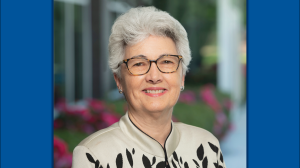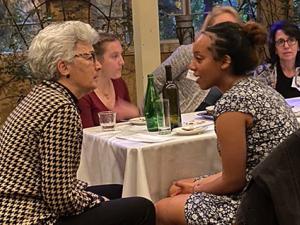Elizabeth Harden M.D.’78: Investing in the Future of Medicine
When Elizabeth Harden entered Duke School of Medicine in 1974, only 22 percent of medical school students in the U.S. were women. At some schools, women applicants were discouraged from pursuing a career in medicine, because it was assumed they couldn’t keep up, or would leave the profession once married.
Harden found no such attitudes at Duke. After all, she and her fellow classmates were joining a school that valued women. Their faculty mentors included Grace Kerby, the first female division chief, in Rheumatology, and the first woman promoted to the rank of professor. There was also pediatrician and child safety pioneer Shirley Kirkman Osterhout ’53, M.D.’57, who had received the student award for excellence in teaching the year before Harden arrived.
“Duke had amazing women faculty members,” Harden recalls. “It felt welcoming.” Harden’s class was also one of the most gender diverse of any U.S. medical school that year and having a sizable cohort of other women students provided Harden with support and camaraderie.
After graduating from the Duke, Harden did her internship and residency at the University of Texas-Southwestern in Dallas before returning to Duke for a fellowship in Hematology-Oncology. That experience introduced her to colleagues who would become lifelong friends and collaborators, including her mentor Joseph Odell Moore, medicine professor Harold Silberman, and hematology professor Wendell F. Rosse, who created the Duke Sickle Cell Center. She also researched T-cell differentiation worked alongside immunologist Barton Haynes, founder of the Duke Human Vaccine Institute.
Harden went on to establish a thriving oncology practice in Newport News, Virginia, with her husband, surgical oncologist Richard Hoefer and longtime friend and colleague oncologist John Kessler. She stayed in touch with her Duke mentors and other faculty as advancements in oncology research and treatments accelerated. “Things we used to dream about in Bart’s lab—using monoclonal antibodies to fight cancer—have come true. When I came out of my fellowship, there were maybe a total of 8-10 cancer treatment drugs, and when I retired it seemed like there were 10 new ones a month. My only regret is that I’m not starting out now. There are so many exciting oncology breakthroughs all the time.”
Having witnessed how dramatically medical advancements transpire, Harden and Hoefer worked closely with School of Medicine Dean Mary Klotman and members of Duke’s Gift Planning office to establish an estate bequest for future physicians and researchers. “Our estate will fund a full professorship as well as two associate professorships. We like the idea of helping young investigators at a critical point in their career.”
Harden also gives generously of her time, informally mentoring students such as Duke WIN Scholar Rebecca Melaku ’22, who aspires to a career in medicine and global health. Harden had served as a mentor to young women at a Virginia high school, and one of those young women has embarked on a successful career in global health. Harden put the two in touch with one another so that Melaku could learn about the options available to her.
“There were women and men who were there for me when I thought medicine was too hard, or when things didn’t work out the way I planned. Life is like that, and everyone needs help along the way.”




